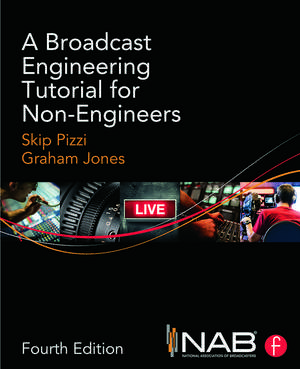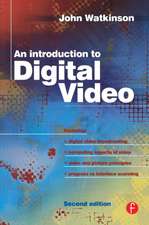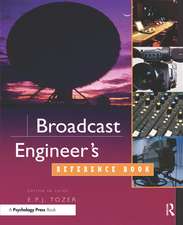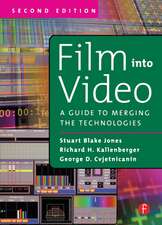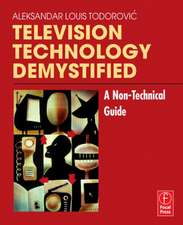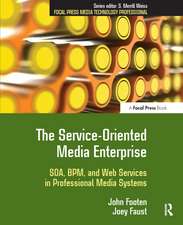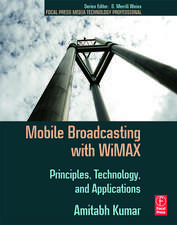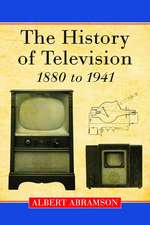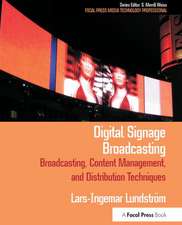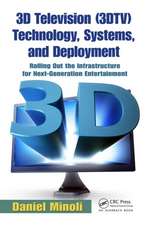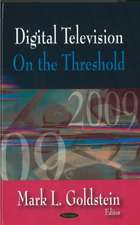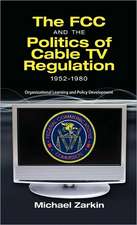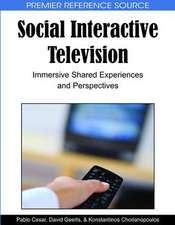A Broadcast Engineering Tutorial for Non-Engineers
Autor Skip Pizzi, Graham Jonesen Limba Engleză Paperback – 27 mar 2014
This long-awaited fourth edition includes new standards and identifies and explains the emerging digital technologies that are revolutionizing the industry, including:
- HDTV—and "UltraHD"
- IP-based production and distribution and Internet delivery (including "over-the-top" TV)
- Connected/Smart TV, Mobile TV Second Screens and Social TV
- "Hybrid" broadcasting (over-the-air and online convergence)
- Podcasting and Mobile Apps
- Connected Cars
| Toate formatele și edițiile | Preț | Express |
|---|---|---|
| Paperback (1) | 371.95 lei 6-8 săpt. | |
| Taylor & Francis – 27 mar 2014 | 371.95 lei 6-8 săpt. | |
| Hardback (1) | 1114.88 lei 6-8 săpt. | |
| Taylor & Francis – apr 2014 | 1114.88 lei 6-8 săpt. |
Preț: 371.95 lei
Nou
Puncte Express: 558
Preț estimativ în valută:
71.17€ • 74.32$ • 58.77£
71.17€ • 74.32$ • 58.77£
Carte tipărită la comandă
Livrare economică 15-29 aprilie
Preluare comenzi: 021 569.72.76
Specificații
ISBN-13: 9780415733397
ISBN-10: 0415733391
Pagini: 360
Ilustrații: 75 black & white illustrations, 5 black & white tables
Dimensiuni: 152 x 229 x 23 mm
Greutate: 0.48 kg
Ediția:Revised
Editura: Taylor & Francis
Colecția Routledge
Locul publicării:Oxford, United Kingdom
ISBN-10: 0415733391
Pagini: 360
Ilustrații: 75 black & white illustrations, 5 black & white tables
Dimensiuni: 152 x 229 x 23 mm
Greutate: 0.48 kg
Ediția:Revised
Editura: Taylor & Francis
Colecția Routledge
Locul publicării:Oxford, United Kingdom
Public țintă
Professional and Professional Practice & DevelopmentCuprins
1. Introduction
BROADCASTING BASICS
2. Types of Broadcasting
3. Sound and Vision
4. Analog Color Television
5. Digital Audio and Video
6. Information Technology
7. Radio Frequency Waves
STUDIOS AND, PRODUCTION, AND PLAYOUT FACILITIES
8. Radio Studios
9. Television Studios and Playout Facilities
10. Remote Broadcasting
11. Links
TRANSMISSION STANDARDS AND SYSTEMS
12. Analog Radio
13. IBOC Digital Radio
14. Alternate Radio Delivery Systems
15. NTSC Analog Television
16. ATSC Digital Television
17. Alternate Television Delivery Systems
18. Next-Generation Television Systems
19. Transmitter Site Facilities
20. Radio Wave Propagation and Broadcast Regulation
21. Conclusion
BROADCASTING BASICS
2. Types of Broadcasting
3. Sound and Vision
4. Analog Color Television
5. Digital Audio and Video
6. Information Technology
7. Radio Frequency Waves
STUDIOS AND, PRODUCTION, AND PLAYOUT FACILITIES
8. Radio Studios
9. Television Studios and Playout Facilities
10. Remote Broadcasting
11. Links
TRANSMISSION STANDARDS AND SYSTEMS
12. Analog Radio
13. IBOC Digital Radio
14. Alternate Radio Delivery Systems
15. NTSC Analog Television
16. ATSC Digital Television
17. Alternate Television Delivery Systems
18. Next-Generation Television Systems
19. Transmitter Site Facilities
20. Radio Wave Propagation and Broadcast Regulation
21. Conclusion
Notă biografică
Skip Pizzi is Senior Director of New Media Technologies at NAB, where he focuses on new methods for creation and delivery of broadcast content. He is also Vice-Chair of ATSC Technology Group 3 (TG3), which is developing standards for the next generation of digital television. Previously he worked in multimedia for 11 years at Microsoft, served as an editor and contributor to several broadcast technology books and journals, and consulted to the professional, educational and government sectors of the media industry worldwide. He began his career as an engineer, manager and technical trainer at NPR. He is a recipient of the Audio Engineering Society’s Board of Governors Award, and a graduate of Georgetown University, where he studied Electrical Engineering, Fine Arts, and International Economics.
Graham Jones retired in 2010 from NAB, where he was a Senior Director working on advanced television issues. He is still active in ATSC, SCTE, and SMPTE standards committees. Previously he was Engineering Director for the Harris/PBS DTV Express, which introduced DTV to many U.S. broadcasters. He started his career with the BBC in London, and has worked as a consultant to broadcasters in many parts of the world. He holds a degree in physics, is a chartered electrical engineer, a fellow of SMPTE, and a life member of the SBE and the Royal Television Society. He has been honored with the Bernard J. Lechner Outstanding Contributor Award from the ATSC and received a citation from SMPTE for outstanding service to the society.
Graham Jones retired in 2010 from NAB, where he was a Senior Director working on advanced television issues. He is still active in ATSC, SCTE, and SMPTE standards committees. Previously he was Engineering Director for the Harris/PBS DTV Express, which introduced DTV to many U.S. broadcasters. He started his career with the BBC in London, and has worked as a consultant to broadcasters in many parts of the world. He holds a degree in physics, is a chartered electrical engineer, a fellow of SMPTE, and a life member of the SBE and the Royal Television Society. He has been honored with the Bernard J. Lechner Outstanding Contributor Award from the ATSC and received a citation from SMPTE for outstanding service to the society.
Recenzii
‘The 4th Edition, published post the digitalization of TV with ATSC transmissions, presents an unprecedented overview of the new world of broadcasting with contemporary technologies being brought to the fore with amazing clarity. Retaining broadcasting as its core theme, it brings you up to speed with the entire chain involved—acquisition, production, broadcasting and streaming. A must-read for all professionals.’ – Amitabh Kumar, Zee Network, India
‘This book is a great source for quickly finding what a particular broadcast-related acronym stands for. Think of this text as a relief valve that lets an interested reader reasonably drink from a high-pressure technical information water main.’ – Dane Ericksen, Hammett & Edison, Inc., USA
‘This book is a must-have for all those in the broadcast industry and reads like a well-written operating manual for your broadcast operation. Skip Pizzi is one of those rare gems—a polymath who can translate complex concepts to the lay person. His deep knowledge allows him to analyze the past and provide a glimpse into what's possible in the future.’ - Jennifer Ferro, President/General Manager, KCRW 89.9, USA
‘This book is a great source for quickly finding what a particular broadcast-related acronym stands for. Think of this text as a relief valve that lets an interested reader reasonably drink from a high-pressure technical information water main.’ – Dane Ericksen, Hammett & Edison, Inc., USA
‘This book is a must-have for all those in the broadcast industry and reads like a well-written operating manual for your broadcast operation. Skip Pizzi is one of those rare gems—a polymath who can translate complex concepts to the lay person. His deep knowledge allows him to analyze the past and provide a glimpse into what's possible in the future.’ - Jennifer Ferro, President/General Manager, KCRW 89.9, USA
Descriere
This book has become "the bible" for the new hires, as well as for anyone that needs to have the basic vocabulary in broadcast. This new edition builds on what worked in the previous one, while adding new standards and defining emerging digital technologies that are revolutionizing the field.
